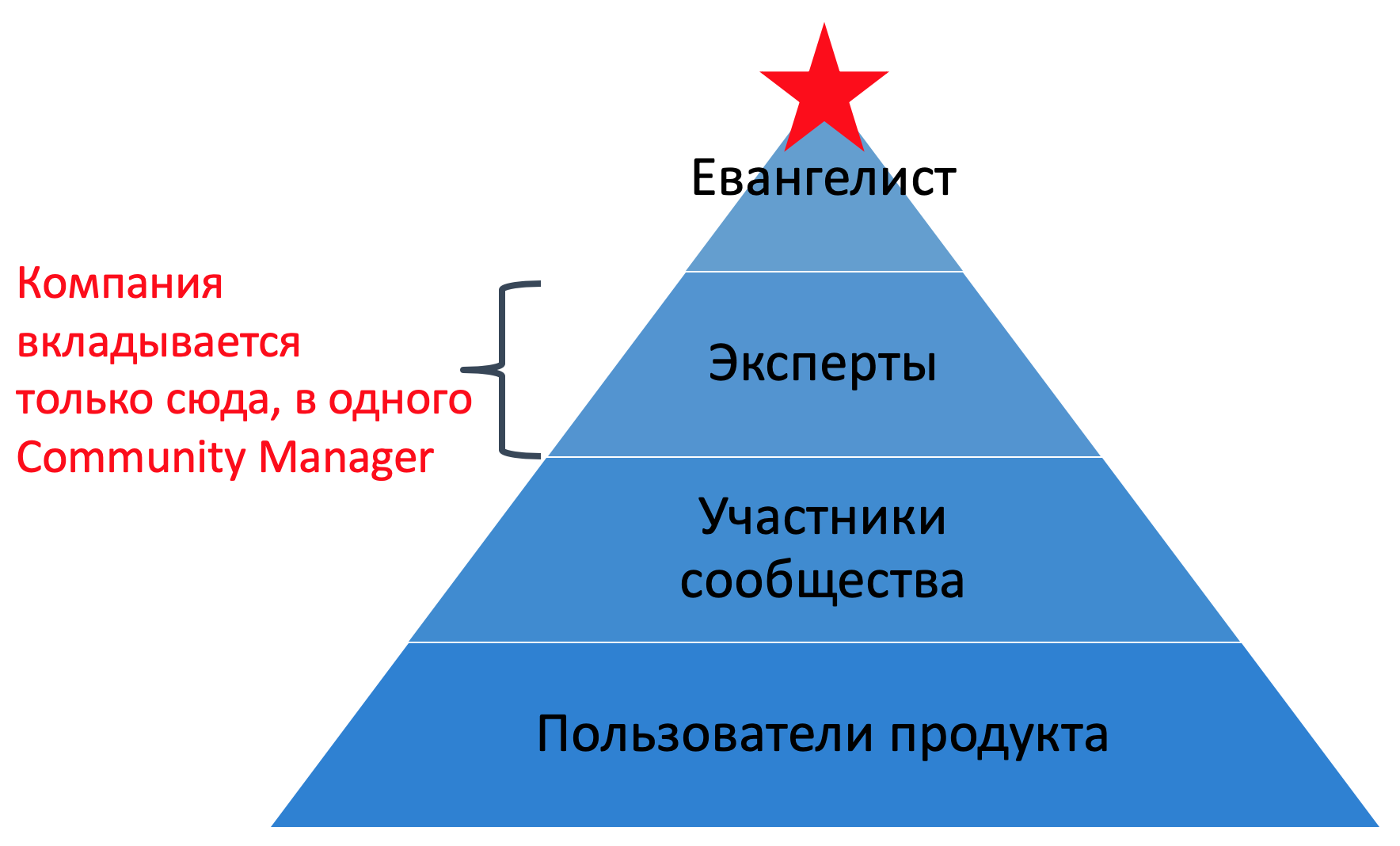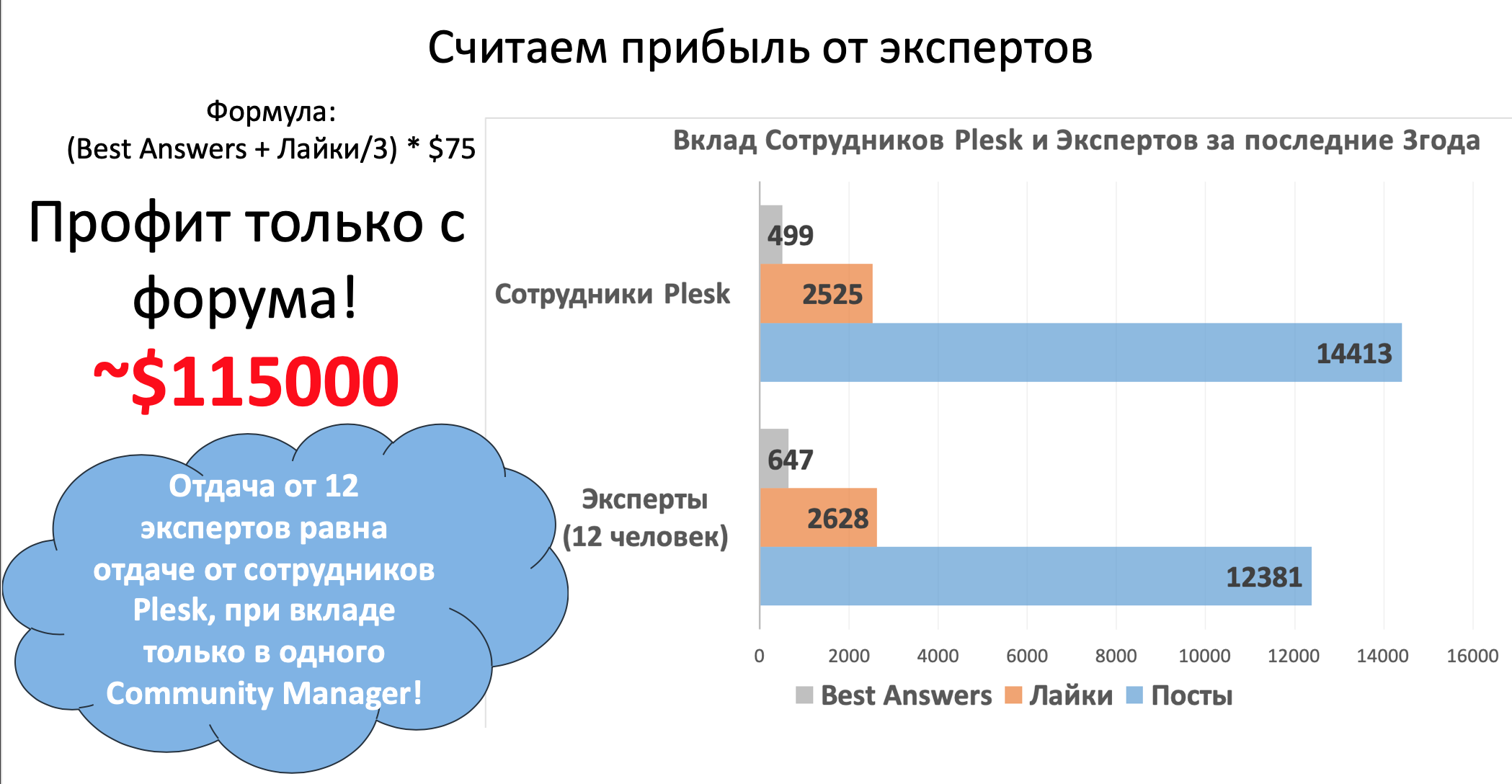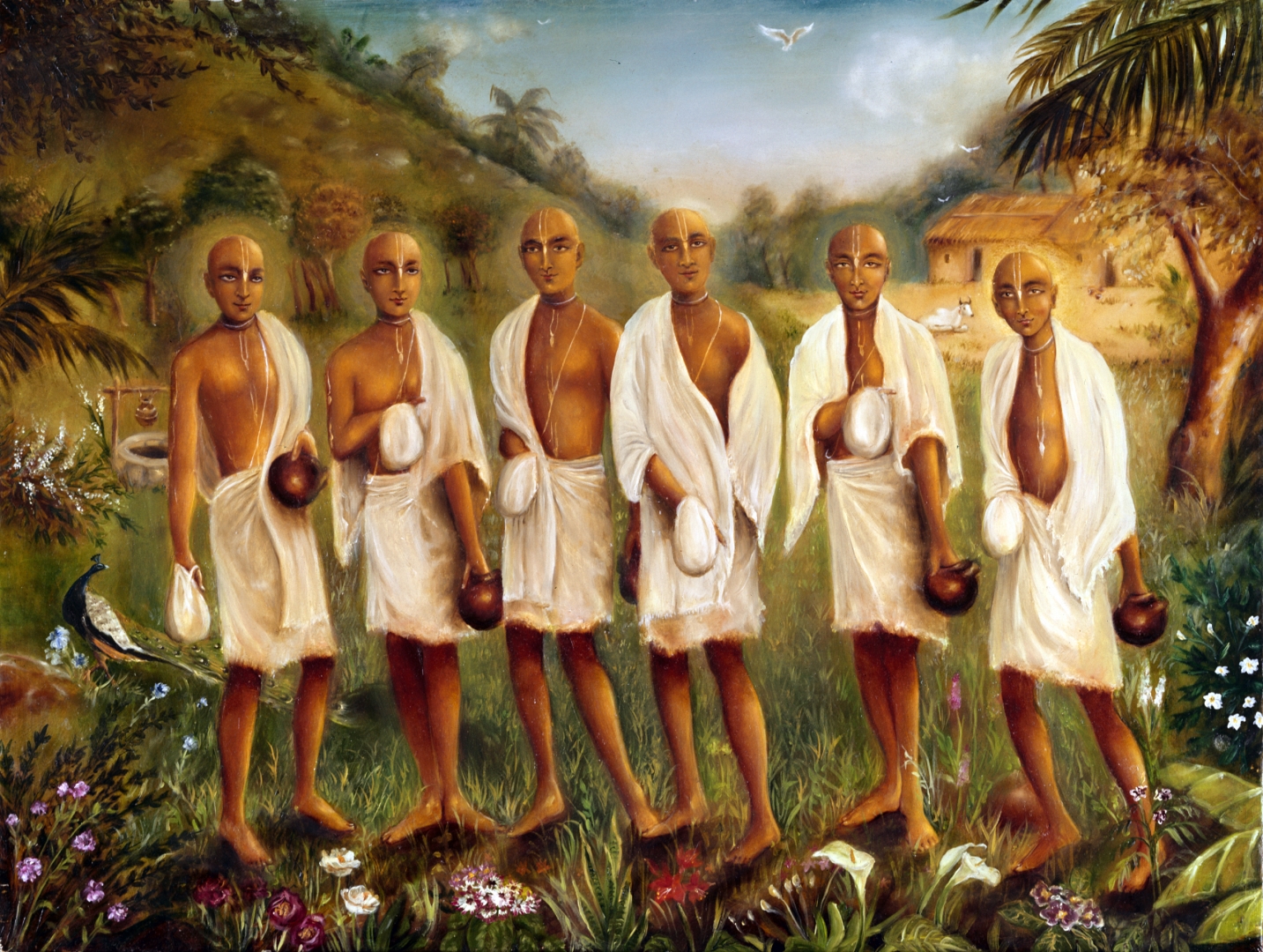How to grow an evangelist for your company

How it all began
I am Community Manager at Plesk. Ten years ago, after six years in the technical support service, I was invited to the R&D department to build a Plesk user community. For the past 10 years, I have been creating and developing a community around our product.
At that time, the company had major partners and customers coming to the technical support service. The company used the B2B2C business model, and therefore Plesk end users did not have access to support. However, there was a company forum where these users of company products who did not have access to support came to and who no one had heard of. In the best case, support staff periodically came to the forum and helped these people solve their specific problems. Thus, the forum was then a bit of a free Support Helpdesk. Nobody systematically dealt with these people. Only the lucky ones got any help there from people from the company or from other users. The R&D department did not receive any useful feedback from these people. The forum engine, launched back in 2003, was outdated and unsuitable for community development on it.
To remedy the situation, it was decided to bring these people together into a strong and effective community around our product. For the community to be such, it had to have its leaders, its own authoritative core, its stars, in the end. I thought it would be nice to call these people a guru, Plesk Guru. The evangelist, an outstanding expert in the field, who promotes the product, infects people with enthusiasm and leads us to new, loyal and loyal customers, who is not an employee of the company and does not receive money from us, would become the highest degree of development for the guru. As the father of IT evangelism, Guy Kawasaki, said, the driving force behind evangelism is the desire of everyone to make the world a better place.. Evangelicals disseminate their recommendations and attract new customers through their faith, and not for material incentives.

Gurus should have taken on the problems of Plesk end users who couldn’t get official tech support. In addition to helping clients, gurus should bring us their pain, desires and suggestions. Using their authority and expertise, they promoted our product on other platforms, such as StackOverflow, Webhostingtalk, FaceBook, Twitter, etc.

The company's strategy was that it invested in only one Community Manager, which manages the community and a club of experts who carry out part of the support and company employees. Community Manager creates the conditions, paves the way for a powerful expert core to emerge, a club of expert gurus. This is a close and real goal. A distant goal, a guiding star was the appearance of the company’s own Evangelist on the basis of prepared soil.

Over the past 10 years, the composition of the elite club Plesk Guru has been constantly changing. For various life reasons, some experts left, others appeared. Today, the elite club Plesk Guru consists of 12 people. Most of them are system administrators, developers or hosters.
The vast majority of gurus from Europe, but there is one expert from the United States. Their current contribution to the community can be seen on the following slide:

In the above formula, assumptions are made that the expert’s answer, marked as Best Answer, can be considered as a resolved ticket in the support. The same can be considered a third of likes. $ 75 is the price of a resolved ticket for the company today.
Thus, 12 experts from the guru club bring the company income comparable to the income from working with the community of company employees. And these are people from support, developers, Community Manager and others. In my opinion, not bad at all.
So, how to prepare the ground, create the conditions?
So, what needs to be done in order to create an elite club of expert gurus in your community and grow from them at least one real Evangelist for your product?
- First you need to create metrics for measuring the user performance of your forum. The mere amount of messages left is not enough. To do this, I launched a powerful gamification system on a new forum engine with a number of important metrics. For example, the number of likes, the number of answers marked by other users as Best Answer, the percentage of responses with likes and Best Answer, the number of published articles and their rating, the presence of a Plesk certificate and others. Funny trophies and descriptions were invented for these trophies. Thus, in addition to my personal impressions of the quality of the expertise of a particular participant, there appeared quite objective numerical indicators arising from the assessments of the entire community. A detailed story about how gamification was introduced can be found in my article .
- The next step was, in fact, the creation of an elite club of experts - Plesk Guru. For this, the club’s clear rules and conditions for getting into it were created and published.

In particular, it was indicated that you can become a member of the club only by invitation, which, according to the canons of the democratic community, any member of the club can nominate a new member, and the candidate must submit his application for consideration. The club’s charter spells out the duties, rights and privileges of a club member. For example, club members have a private section on the forum for private discussion of problems and direct communication with company employees. They have special public recognition on the company's website, their own graphic badges, the ability to access early versions of the company's products, free licenses, invitations to offices and official events of the company. For them, an annual competition for the best Guru of the year is held with awarding cool branded prizes (for example,here . - One of the conditions for participation in the club of experts and at the same time, one of the expertise metrics, was certification at Plesk University . Plesk University was opened to the


general public in February 2016. Now it has approximately 2,000 active users (those who have completed at least one course). Approximately 820 students are certified - this is 40% of the total number and 50% of the number of those who completed the courses required for exams (we do not have all courses with exams). About 500 unique users come to the university every month. There are 23 courses in the university catalog, and this figure will increase - we continue to work and create new content. - To receive feedback, two main channels were created:
- Form for sending clearly structured reports from the forum to the third line of technical support. To date, through this form, Plesk developers have received and processed more than 260 reports. An interesting detail: in the form of sending a report, the expectation from the third technical support line can be chosen as “Confirm the bug”, “Help to figure it out” and “Answer the question”.
- To collect and work with Feature Request, the Plesk UserVoice project was launched from the community , where people write their wishes and other people vote for them. At the moment, the database of collected Feature Requests has more than 1300 requests in different statuses for working on them. About 650 requests were somehow implemented in different versions of Plesk.
- In order for our gurus to share their decisions, experiences, life hacks, a special section was created on the Resources forum . The section has a powerful rating system, commenting. Unfortunately, this form of contribution to the community has not become as popular as I expected. So far, the largest contribution to it comes from company employees. Users and experts so far prefer to share their solutions directly in the forum topics.
- For quick and no complicated and lengthy research of communication, the forum was launched Discord chat . Our experts, for whom this format of assistance is convenient, actively use it.
The listed tools allowed us to identify the most active and effective experts. The question arose of their growth and further use of their potential. The most effective received proposals from the technical support department for cooperation. They continued to share their expertise in an open forum and at the same time got the opportunity to work as freelance technical support employees. Yes, this obviously contradicts the spirit of evangelism, but firstly there were rare exceptions, and secondly, even highly spiritual bishops sometimes succumbed to temptations. In addition, it was in its pure form internal evangelism, which is very common in many companies.
In the end, our built-up strategy for the development of an expert club brought results. The greatest growth was achieved by one of our experts from Germany.

He appeared on the forum suddenly and in the very first months of his presence showed phenomenal results. The answers to customer problems flew from him almost around the clock and were distinguished by their excellent style, careful study and the highest quality expertise. Many on the forum considered him an employee of the company. The authority in the community was the highest. However, his main job was not related to hosting at all, and working in the Plesk community was just his hobby. He quickly found a common language with me, and through me with the management of the company. He began to make very useful suggestions for working with the community and participated in projects completely free of charge. His loyalty to the company and his infatuation with the idea of promoting Plesk fascinated. The contribution to the community was invaluable and it was decided that that the company cannot afford to lose an expert of this level. Here it should be noted that experts are ordinary people with their problems, diseases, interests, and so on. And for these or other reasons, they often simply disappeared after some time. This feature of working in the mode of a short flash of a “supernova” should always be borne in mind when working with such people. And so we could not lose a star of this magnitude. To some extent we were lucky. On a long and carefully prepared basis, the Evangelist grew, he revealed himself, and we really wanted to extend his activity by any means, despite the fact that he had many reasons to disappear, of which we knew. As a result, the head of the marketing department came to his city and held direct negotiations with him with offers that were difficult for him to refuse. He essentially received the position of internal Evangelist within the marketing department. His activity at numerous conferences around the world was impressive. He visited our Novosibirsk office, our annual summer corporate party and infected everyone around with his dedication and devotion to the product. He generated a huge number of ideas and suggestions. He was the Evangelist in the most precise sense of the term. His contribution according to the same approximate formula that was given above can be estimated in comparison with an expert club: He was the Evangelist in the most precise sense of the term. His contribution according to the same approximate formula that was given above can be estimated in comparison with an expert club: He was the Evangelist in the most precise sense of the term. His contribution according to the same approximate formula that was given above can be estimated in comparison with an expert club:

It can be seen that one Evangelist is worth four to five ordinary experts!
But like Guy Kawasaki for Apple, our Evangelist did not serve the company for long. Talented people do not stand still, but always move on. So our Evangelist went further on his way to his new goals. They rarely appear, helping them to appear, growing them is extremely difficult, but this is not a reason to refuse it, not a reason not to believe in the emergence of a new Evangelist. For any company, a true Evangelist of its product is an unusually valuable success.
Conclusion and Recipe
Ten years ago, we did not have a true Plesk community. We did not have experts and evangelists. And today we have:
- Community of people calling themselves Pleskians
- 13 expert gurus from different countries
- Hundreds of communications over communications
- Presence on FaceBook, Twitter, StackOverflow, etc.
- Cool Plesk University
- One 100% Evangelist Grown
- Often the word of the Evangelist is more significant for the community.
- New Evangelists on the way
Now our pain is that there has become so much feedback that we do not have time to quickly work with it, isolate valuable from it and implement it in the product as quickly as possible. Now people complain not that no one hears them, but that their requests and suggestions are not being implemented as quickly as they would like. We have built a community, and now we need to learn how to make the most of what it gives us. The ball is on our side.
In fact, the recipe for your company is quite simple:
- Create a flexible and effective metric system to evaluate the contribution of any member of your community
- Create clear and transparent rules, your community’s charter
- Give your community the opportunity to grow, learn new aspects of your product
- Encourage the success of outstanding members of your community
- Become open to your customers, open channels for communication with you
- Be careful and don't miss a supernova flash
- Try to create conditions in the company so that the star of the Evangelist will shine for your company as long as possible
Then you will create ideal conditions for the core of your community to be powerful and effective, for you to be lucky one day, and from this core your own Evangelist will emerge, a person who, with his charisma and energy, will ignite the love of your product in the hearts of many people.
